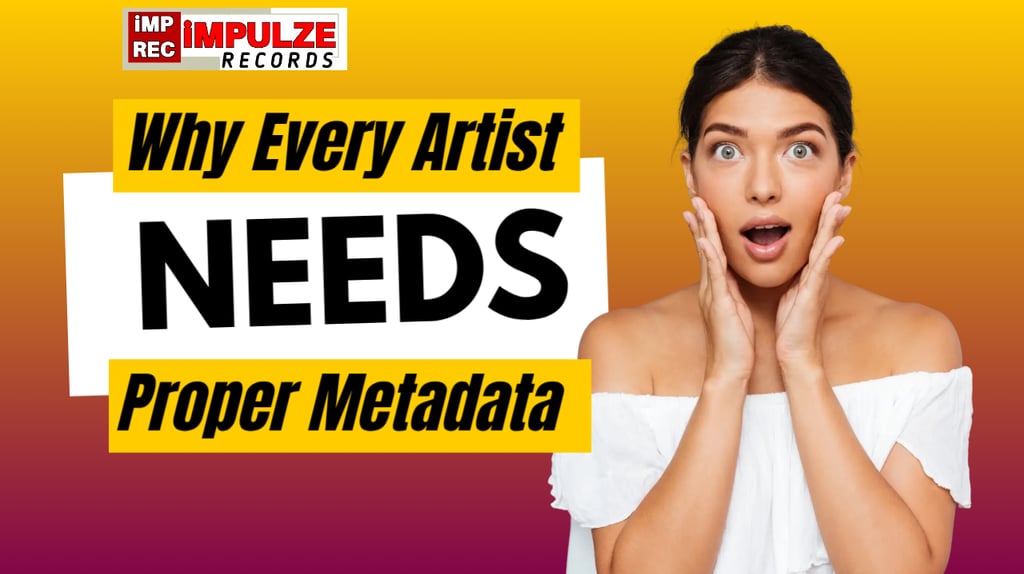Every Artist Needs Proper Metadata — The Secret Behind Streams, Search & Royalty Payments
In today’s music industry, talent alone is NOT enough. You can have the best voice, the cleanest mix, and the most emotional songwriting — but if your metadata is wrong, incomplete, or inconsistent, your music will struggle to grow...
MUSIC BUSINESSEDITORIAL
Grace A.
11/22/20253 min read


Why Every Artist Needs Proper Metadata — The Secret Behind Streams, Search & Royalty Payments
In today’s music industry, talent alone is NOT enough. You can have the best voice, the cleanest mix, and the most emotional songwriting — but if your metadata is wrong, incomplete, or inconsistent, your music will struggle to grow.
Metadata is one of the most important (and most misunderstood) factors in the entire digital music ecosystem. It affects everything from:
How your music is found
How it’s categorized
How it performs in algorithms
How much royalty you get paid
And even whether you get paid at all
Unfortunately, most independent artists have no idea how metadata works — and this lack of knowledge causes millions of dollars in lost royalties every year.
This blog breaks everything down in simple language, shows why metadata matters, and explains how iMPULZE RECORDS helps artists fix and optimize it.
What Exactly Is Metadata?
Metadata = the information attached to your song.
It is the data behind your music that tells DSPs (Spotify, Apple Music, Boomplay, etc.) everything they need to know.
Core metadata includes:
Artist name
Featured artists
Song title
Album name
Producer & songwriter credits
Genre
Subgenre
Mood (vibe)
Release year
Copyright owner
Publisher
ISRC (International Standard Recording Code)
UPC (Universal Product Code)
Language
Explicit or clean flag
This information seems simple, but it is the difference between a song that becomes discoverable and one that disappears.
Why Metadata Is the Heart of Digital Music Success
1. Metadata determines who gets paid — and who doesn’t
If your metadata is incorrect:
Royalties may go to the wrong artist
Royalties may remain unclaimed
You may earn NOTHING even if your song is streaming
DSPs may permanently delay your payouts
Your song might be “lost” in the system
Errors like:
Misspelled names
Wrong ISRC
No ISRC
Wrong songwriter percentages
…are extremely common.
This is why so many artists — especially in Africa and the Pacific — never receive a single cent from their releases.
Metadata = Money.
If it’s wrong, your money goes missing.
2. Metadata affects your discoverability on DSPs
Streaming platforms use search engines similar to Google.
If your metadata is incomplete or wrong:
Fans can’t find you
Your tracks won’t show in related artists
You won’t be included in algorithmic playlists
Your music won’t appear in searches (even when typed correctly)
It’s not magic — algorithms need information.
If you don’t feed them properly, they don’t feed you streams.
3. Metadata helps you appear on playlists
Playlist editors ALWAYS check:
Correct genres
Proper credits
Release details
Professional presentation
Bad metadata = no playlist placement.
Spotify algorithms (Radio, Discover Weekly, Release Radar) also depend heavily on clean, structured metadata.
If your metadata is a mess, your playlist chances drop by more than 70%.
4. Metadata protects your identity
Without correct metadata, DSPs may:
Mix your songs with another artist
Put your release on someone else’s profile
Duplicate your artist pages
Create “ghost profiles” for your music
This is one of the BIGGEST problems for independent artists.
It destroys your:
Streams
Monthly listeners
Artist credibility
Royalty tracking
Fan engagement
This is why so many artists ask:
“Why is my music on a different artist page?”
“Why do I have two Spotify profiles?”
“Why can’t I get verified?”
“Why did someone upload my music without permission?”
Metadata is the answer.
5. Metadata helps protect your copyrights
Your metadata is part of your legal identity.
If someone tries to:
Steal your music
Upload your song without permission
Claim your royalties
Your metadata is your proof.
With proper metadata + PRO registration, your music becomes traceable globally, making it much harder for thieves and unauthorized distributors to exploit your work.
Common Metadata Mistakes Artists Make
These are the most common errors we see when artists come to iMPULZE RECORDS for help:
❌ Using different spellings of their artist name
Example:
"Karina Be" vs "Karina-B" vs “KarinaB”
This splits your catalog.
❌ Releasing music without proper credits
DSPs punish incomplete metadata.
❌ No ISRC or wrong ISRC
This causes:
Missing royalties
Lost ownership
Impossible royalty claims
❌ Wrong genre or mood selection
Spotify can’t push your song to the correct audience.
❌ No publisher or PRO registration
Your performance royalties go missing forever.
❌ No lyric sync metadata
Lyrics increase engagement dramatically.
❌ No release-level metadata
Albums often lack:
Publisher
Copyright owner
Song registration
Release year
All of these affect royalty payout.
How iMPULZE RECORDS Fixes Your Metadata (Professionally & Remotely)
At iMPULZE RECORDS, metadata optimization is one of our core specialties.
We handle:
✔️ Full metadata cleaning
✔️ ISRC assignment
✔️ UPC assignment
✔️ Formatting according to DSP standards
✔️ Artist name unification
✔️ Duplicate profile removal
✔️ Publisher + songwriter setup
✔️ Explicit/clean tagging
✔️ Song registration using ASCAP/BMI/MCSN
✔️ Lyrics formatting (Musixmatch)
✔️ YouTube Content ID mapping
We also optimize for:
Spotify
Apple Music
Boomplay
Audiomack
YouTube OAC
Deezer
TikTok Music
Your entire digital identity is cleaned, standardized, and protected across the global music system.
© 2025 | iMPULZE RECORDS | All Rights Reserved | Where Music Meets Excellence.

